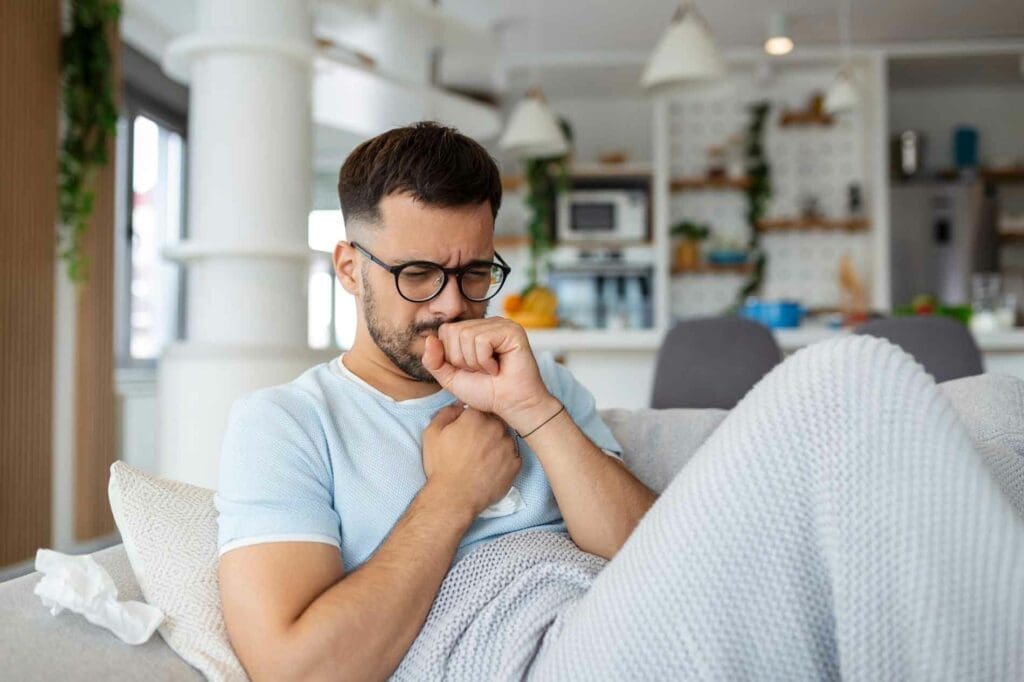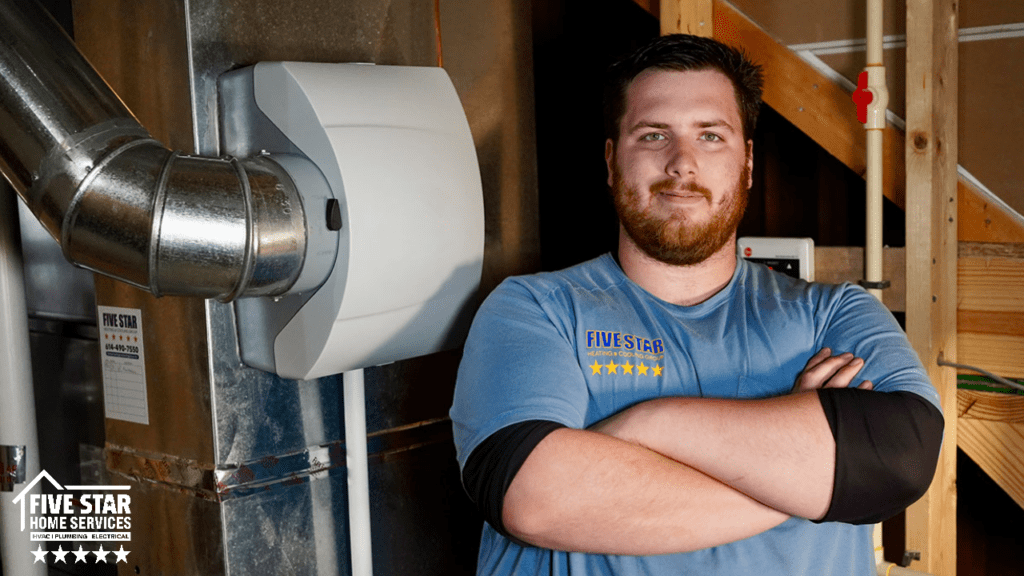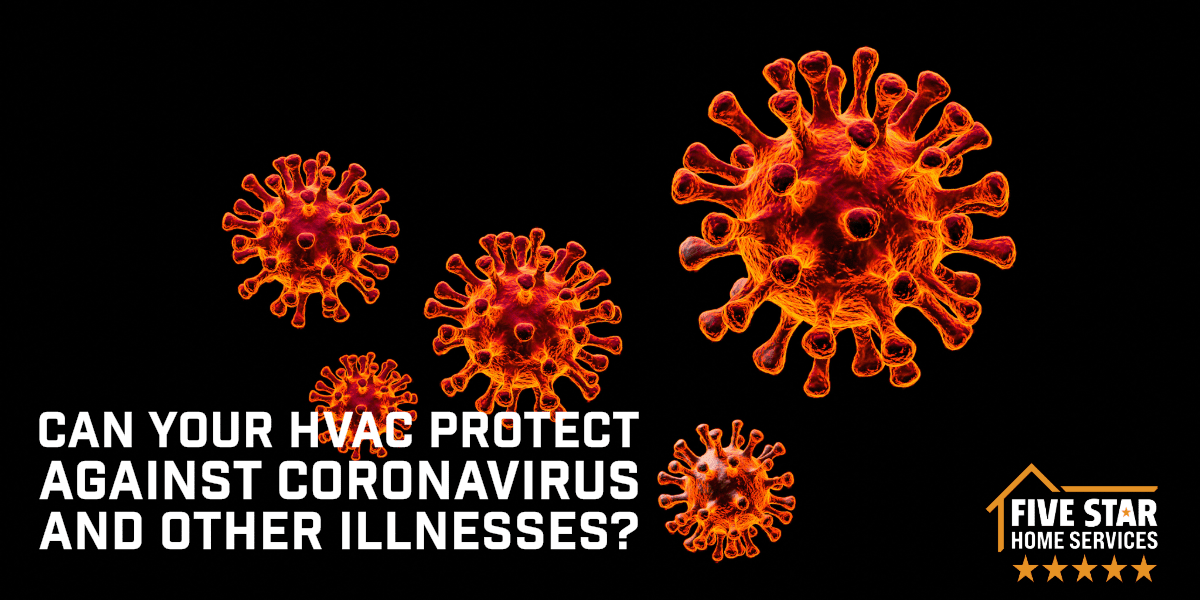Intro
COVID-19, otherwise known as the Coronavirus, has dominated the world news in recent years; additionally, it has also caused a number of questions regarding the use of HVAC equipment in helping to mitigate the risk of infection. Your friends at Five Star Home Services are here to answer these questions!
In recent years, COVID-19 has been a daily topic of conversation in the news.
Like everyone else in this business, we’ve been trying to learn everything we can, take the proper precautions, and stay safe in these dangerous times. Nevertheless, we are also getting a lot of questions about HVAC systems. Can home comfort systems transmit COVID? Or, can they protect against viruses like COVID?
Also, people are wondering what they can do to protect their families and keep everyone healthy.
Although we aren’t medical experts — we certainly are HVAC experts. As new studies and new data pours in, we have been able to develop tentative conclusions. With decades worth of information on HVAC systems as how they relate to illnesses and virus strains, including some that are very similar to the coronavirus, we can offer some guidance.

Utilizing this information, which has been corroborated by recent studies and expert recommendations, we can begin to form solutions that should benefit any home.
Additionally, we are also going to walk you through some of the problems that can be associated with HVAC systems and illnesses and discuss some of the various solutions. Because of the lack of testing for COVID — some conclusions will need to remain speculative. Nevertheless, the data we have for HVAC systems and other viruses and illnesses will enable us to draw more confident conclusions when discussing overall health implications.
Indoor Air Quality Problems
The perennial problems:
- Allergies
- Seasonal flu
- Respiratory issues from mold
- Other irritants such as pet dander or pollen
The “new” problems:
- Coronavirus
- Air quality for immunocompromised or otherwise at-risk populations
- Maintaining air quality and health during quarantines and limiting transmission between building inhabitants and/or families
Just so we are clear, these “new” problems have always existed to some degree. We have even seen the spread of other coronaviruses in the world, though obviously not to the same extent as with COVID-19, which shut the world down.
Nevertheless, even something as simple as passing around the flu can have huge benefits.
In short, we are saying that solutions do exist. Although they aren’t foolproof, together, they can make a huge difference.
Indoor Air Quality Solutions
Experts at the Environmental Protection Agency (EPA) say that running an HVAC system can be one part of a larger plan to protect your home. So what’s that larger plan you might wonder? It includes several factors, each of which can significantly contribute to the health and safety of those in your home. These areas include the following:
- Air purification options
- Proactive humidity control
- Proper filtration management
- Non-HVAC best practices as recommended by expert health organizations
Moving forward, we will delve into each of these. Nevertheless, it is important to note that there’s no silver bullet here. Even carefully-defined, proactive approaches to mitigating COVID-19 and other illnesses aren’t entirely foolproof. Nevertheless, when combined with one or more, they offer significant improvements in the risk level of you and those closest to you.
Humidity Control and Viruses
A wealth of recent studies (including those from Yale and The American Society for Microbiology) now show low humidity levels can contribute to the transmission of the flu and other airborne illnesses. This is because low-humidity environments are ideal for SARS coronaviruses to proliferate and survive.
In these settings, the humidity levels were found to be anywhere from 20% to 40% humidity. At this relative humidity range, coronaviruses survive on surfaces for a far longer period of time, which has obvious implications for areas used by multiple people.
These studies also found that humans’ ability to fight infection and recover from illness was lower at low humidity levels. Both in the prevention of sickness and removal of the illness from the body, functioning is impaired at low humidity ranges.
During the wintertime, this is one of the biggest risks. Historically, humidity is at its lowest during these times. Even here in Central Ohio, relative indoor humidity can reach as low as 15% during the winter months.
Now, keep in mind that the opposite — which is high humidity levels — is problematic for other reasons. However, the goal is to keep humidity levels in an acceptable range at all times.
In general, the ideal level of humidity is often cited as 35% to 50%. Anything at or above 60% creates an environment for potential problems, and anything lower than 35%, as we’ve seen in the studies cited, can increase the risk of infection. Similar studies performed by Munters found nearly identical results, with the highest levels of virus inactivation coming at 50% humidity.
Controlling Your Humidity
For controlling the humidity in an entire home, a portable humidifier isn’t going to cut it alone. Although they can be used in specific situations, they aren’t suited for larger settings.
The only way to ensure proper humidity levels year-round throughout the home is with the use of a humidity-controlling HVAC product.

Ducted, whole-home humidifiers are great! They are the most obvious solutions to those dry winter conditions. They can proactively manage humidity levels to keep you in safer operating ranges.
During the summertime, your air conditioner actually does a lot to dehumidify your home. In very humid climates with damp basements, installing a whole-home dehumidifier is often necessary to stay within acceptable ranges. The product pays for itself.
Nevertheless, our recommendations change based on where homeowners live. If you don’t have a basement, you might not require a dehumidifier. If you live in a humid coastal area, you might never need a humidifier — even during the winter.
Regardless, the research appears to be obvious, and it matches what we’ve known about seasonal flu viruses for a long time. You should plan accordingly. This way you’re able to mitigate your risk significantly in the most dangerous months of the year for coronavirus and other viral infections.
Air Filtration and COVID
The National Air Filtration Association (NAFA) reports that there isn’t a “best” filter to prevent COVID-19 and similar viruses. However, anything below a MERV 8 filter will be significantly less effective.
MERV is short for Minimum Efficiency Reporting Value. It’s a measure of how well a filter can remove certain microscopic particles from the air.
Additional studies show that filters at or above MERV 13 would be required to significantly reduce novel coronavirus particles. As NAFA reports, DNA and RNA from similar virus strains that travel via droplets (as coronavirus is widely assumed to travel) have been found on HVAC air filters.
Controlling Your Filtration
While all this information is interesting, it is solely for academic purposes until it is applied to a home. So, what can you do to make a difference in filtration?
There are several things that are helpful. The following includes some of them:
- Check and change your furnace’s air filter according to its recommended schedule. This could be as little as 60 to 90 days, or up to about six months for some larger filters.
- Experts recommend wearing gloves when you replace your filter, and assuming that there are active microbiological materials in them when you do so.
- Upgrade your system’s air filter to one that is both higher MERV while maintaining compatibility with your HVAC system. Higher MERV on its own isn’t always good if it isn’t designed to work well with your system.
- If your system allows for it, run the system’s blower fan for longer periods (or continuously), even if you aren’t heating or cooling. The reason being, your filter is only clearing the air when the fan is running. Many modern HVAC systems will allow fan-only use, regardless of whether or not the furnace or A/C is running.
These bullet are important. Nevertheless, we also want to stress it’s not always a great idea unless you pick the right air filter. If you upgrade from a low-MERV one-inch filter to a very dense one-inch air filter — it can actually inhibit airflow. This can be potentially damaging to your HVAC system in other ways, some of which are ultimately related to your indoor air quality.
At Five Star Home Services, we often recommend Aprilaire’s four-inch media filters, which offer amazing air filtration while also still allowing for ample amounts of airflow. They don’t need to be replaced as often as many filters, and can be purchased at MERV ratings that will effectively trap particles the size of coronavirus. We also sell a lot of ionization air purification systems, such as the I-Wave-R.
UV Light & Ionization
In the search for air quality solutions, a lot of customers ask about UV lamps and similar air purification technologies such as our iWave-r.
UV lamps are extremely effective at reducing infections from numerous types of viruses. However, they have not been tested on COVID-19 to date. Nevertheless, they have proven to be effective against several similar viruses. These viruses include Strep, MRSA, Listeria, Norwalk, Bird flu, and Tuberculosis, and many others.
In any case, UV light requires particles to pass through it in order to be effective. This makes the installation and placement of a UV lamp very important. Although there are some DIY options, it’s generally best to have it installed by a professional HVAC installer.
Ionizers, on the other hand, neutralize the particles themselves by binding them into an inert form, whereas UV lamps simply kill organic material.
Controlling Your Air Quality
At Five Star Home Services, we regularly install the Reme Halo Air Purifier in homes as well as the iwave-r. We love these products because they utilizes both UV and ionization techniques. They proactively disperse all sorts of particulates that will react with viruses into your ductwork. They kill viruses, and in the age of COVID, we believe this is more important than ever.
To reiterate once again — no testing has ever been done on COVID-19. Below is a statement from RGF Environmental Group, the company that makes the Reme Halo regarding this matter:
“We currently do not have testing on the Wuhan Coronavirus (COVID-19). We are evaluating testing options with partners in both the U.S. and China. As there are a limited number of facilities capable of testing for this virus, their focus is on prioritizing testing as it relates directly to recent outbreaks.
“COVID-19 is a member of the enveloped RNA Coronavirus (subgenus sarbe covirus Orthocoronavirinae) subfamily. While RGF does not have testing specific on COVID-19, we have validated test results showing 99+% reductions on similar viruses. These viruses, like COVID-19, are also ‘enveloped’ or protein jacketed virus types. If we can reduce these virus types, an assumption can be made that we would also be effective at reducing the current Coronavirus at hand. Important to note that we make no medical claims.”
The lack of a definitive answer can be frustrating for some. However, the past results from the Reme Halo, and other products of similar intent, are promising.
Going Beyond HVAC For COVID Protection
Keep in mind that none of this is meant to replace day-to-day best practices to protect yourself from the coronavirus. We always pay close attention to all the CDC guidelines and latest studies that inform our practices as an HVAC company. We also that will inform our conduct as individuals and citizens working toward the common good of eradicating the virus. This includes wearing masks and gloves at appropriate times, as well as social distancing while regularly washing your hands, and maintaining a clean environment in your home and professional life are all recommended practices that experts agree upon.
Although there aren’t any specific HVAC measures that can ensure your health and safety, we hope it’s clear that when a full plan of action is created, your HVAC system can work with you in the fight against not just coronavirus but other illnesses and viruses as well.
No-Contact Service Calls
At Five Star Home Services, we are always doing our part! Because HVAC services were deemed essential during the coronavirus lockdowns — we kept our doors open and sent our workforce into homes throughout the pandemic.
Nevertheless, we take all the necessary precautions.
This includes addressing any concerns that our customers may have; we’ve instituted no-contact service calls, as well as a number of other safety precautions in our offices. We also remain compliant with all guidelines from local, state, and national governing bodies. We were able to operate safely throughout the pandemic.
We politely remind everyone that Americans spend about 90% of their lives indoors. Because of this, indoor air quality issues are important.
If you have questions regarding our health and safety practices or live in the Greater Columbus, Greater Dayton or Greater Cincinnati Ohio areas and would like to schedule your own “no contact” in-house estimate or service call, we hope you’ll give us a call today!
Call us today at (833) 405-8009.

